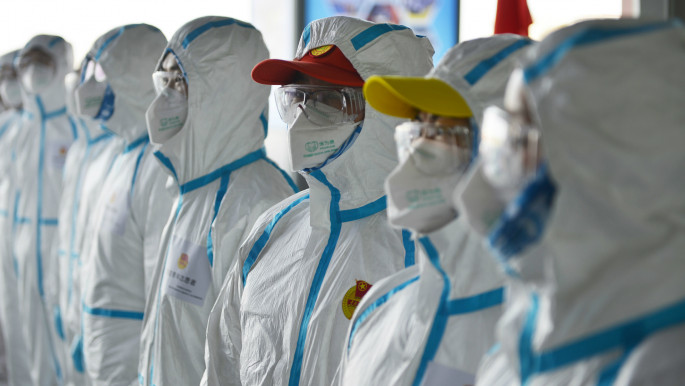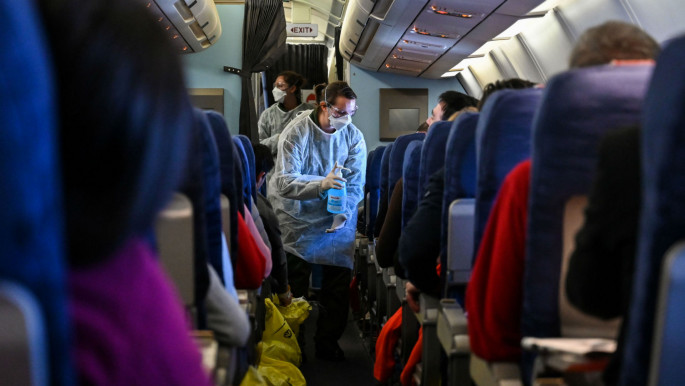Arab countries are preparing for a possible coronavirus outbreak
According to the World Health Organisation's (WHO) latest figures, there are more than 20,438 confirmed cases of the Novel Coronavirus (2019-nCoV) worldwide, with the vast majority - 17,238 cases - in China.
At least 425 people have died as a result of the deadly virus, most of them in China's Hubei province. A man from Wuhan died in the Philippines on 2 February and Hong Kong reported its first death on 4 February.
The virus spread is concentrated in East Asia, with cases in China, Japan, Korea, Singapore and Malaysia. However the coronavirus has been spreading across the world as those infected travel around the world, and Australia, France and the UK have also reported cases of the virus.
The UAE was the first - and so far only - country in the Middle East to report a case of coronavirus in its country, but it has made the region erupt in a flurry of panic.
Five Chinese patients were screened and confirmed to have the virus, with four of them from the same family. Last month Abu Dhabi said doctors were treating a family-of-four that had come from a Chinese city at the centre of the outbreak.
The diagnosed people were in stable condition and under medical observation, and the ministry said they would be released in two weeks.
Read More: Could coronavirus impact oil markets?
At the time the ministry assured the public that the discovery of the virus in the Gulf state "is not a cause for concern", however, as the numbers of those infected rose, countries in the Middle East are taking increased precautions.
What is the coronavirus?
According to the WHO, coronaviruses are a family of viruses that cause a range of illnesses, from a mild common cold to more severe diseases, for example SARS and Middle East Respiratory Syndrome (MERS).
 |
| Coronavirus gets its name from the Latin word for crown [Getty] |
These viruses transmit between animals and people, and several strains exist only animals. The virus was named after the Latin word corona which means "crown"; under an electron microscope, the image of the virus has been compared to a solar corona.
The novel strain, which was identified by Chinese authorities on 7 January, is a new strain that had not been previously identified in humans.
According to the WHO, symptoms include fever, cough, shortness of breath and breathing difficulties.
In severe cases it can lead to pneumonia, SARS, kidney failure and death.
There is currently no treatment for the virus, and a tentative vaccine won’t be ready until the end of the year.
The Middle East, as well as Turkey and other Muslim-majority countries are doing everything they can to prevent a spread.
Limiting travel to and from affected areas
Earlier this week the UAE announced a suspension of flights to and from China - with the exception of the capital Beijing - in an effort to contain the new virus, its state-run WAN news agency announced on Monday.
The suspension will come into effect on 5 February, the UAE's General Civil Aviation Authority (GCAA) said in a statement.
"We continue to put our confidence in the Chinese government's efforts to control and contain the situation," the GCAA said, adding that passengers travelling from Beijing International Airport will undergo six to eight hours comprehensive medical screening at the airport before boarding.
|
The GCAA's statement said all flights to and from Wuhan from the UAE have been cancelled since 23 January.
Qatar Airways and Egypt Air joins Delta and United Airlines temporarily suspended China routes in a bid to contain the virus.
The UAE isn't the only country in the Middle East to suspend flights. Over the weekend Oman, Saudi Arabia and Egypt, along with Australia, Italy, Finland and Indonesia also suspended flights to China.
Iraq's Basra International Airport announced a move to refuse entry to passengers of any nationality travelling to into the country from China, amid global fears amid a deadly coronavirus outbreak.
In the UK, British Airways was one of the first airlines to suspend travel to China.
Halting food exports from affected areas
On Sunday, Jordanian authorities announced a halt on Chinese animal and vegetable products as a precaution, the agriculture ministry announced on Monday.
The director of the ministry’s licensing department Karim Al-Hussami told reporters that the decision was made in an effort to prevent the spread of the coronavirus to Jordan.
"Import licenses from China have been suspended until further notice," Al-Hussami said.
Though there are rumours that coronavirus originated in bats, there is no evidence that meat-eating is linked to the virus, and you can't catch it from pets.
The WHO advises people to wash hands with soap after touching animals and animal products.
 |
| Thousands of masks are being ordered around the world for prevention [Getty] |
"Avoid consumption of raw or undercooked animal products," its website instructs. "Handle raw meat, milk or animal organs with care and avoid cross-contamination with uncooked foods."
Designated 'quarantine' spots
A controversial move by the Tunisian ministry of health to ensure the country is prepared should there be cases of the new coronavirus have sparked widespread controversy.
The ministry, in coordination with Tunisia's ministry for tourism, designated a hostel in a southern suburb of Tunisia as a potential quarantine spot.
But the plan has faced serious backlash, with members of the municipal council threatening collective resignation over the move. The area's local population has also said they will protest if the plan is implemented.
The ministry's choice of Hammam Chott poses a danger to local residents and visitors, and will have economic and social repercussions, the mayor added.
The ministry's chosen area includes a university complex resident to thousands of students, an international centre for scouts, a sports complex, resorts and approximately forty thousand residents, according to Zaqrouba
Keeping port entry tight
While some countries have adopted a closed-doors policy to prevent the spread of coronavirus, others are looking to its ports.
Turkey, which has not reported any cases has nonetheless taken drastic measures to protect its port, an official said on Monday.
 |
| A crew member of an evacuation flight of French citizens from Wuhan gives out disinfectant [Getty] |
He added that a total of 33 health inspection centres are prepared to deal with any possible cases.
Hysteria
People of Asian descent are reporting more cases of xenophobia, with China accusing America of deliberately drumming up panic over the virus.
The US "hasn't provided any substantial assistance" and has only created "panic", said foreign ministry spokeswoman Hua Chunying at a regular press briefing.
People in online across the world, including Lebanon have said they no longer wish to order products from Asian websites like AliExpress over fears of transmitting the virus - despite no proof this could happen.
The director of the Center for Disease Controls' (CDC) Center for Immunisation and Respiratory Diseases Dr. Nancy Messonnier said that due to the poor survivability of these kind of viruses on surfaces "there is likely very very low risk of spread from products or packaging that are shipped over a period of days or weeks at ambient temperatures".
Racist incidents have been reported across the world, from the UK, Australia, France and parts of the Middle East as citizens of Asian descent are the recipients of abuse.
The French hashtag #JeNeSuisPasUnVirus [I am not a virus] has been trending online and they use it to complain about the abuse they have received on public transport, social media and even mainstream media.
One Twitter user recalled that she had been on her way home from work when she overheard two people saying, "look out a Chinese girl is coming our way".
"I'm Vietnamese," the girl added.
Follow us on Facebook, Twitter and Instagram to stay connected



